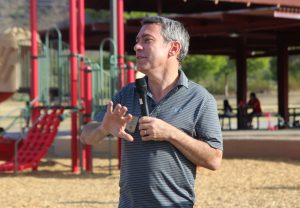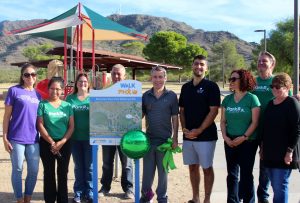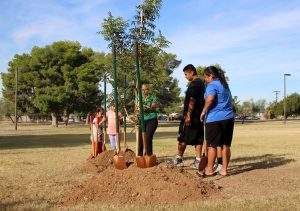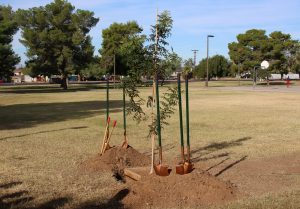- Slug: BC-CNS ParkRX Phoenix, 520 words.
- 4 photos and captions below.
EDS: A previous version of this story misidentified some of the participating parks in the fifth graf. The correct parks include Phoenix’s Mountain View, Norton and Sunnyslope parks, as well as El Prado Park. The story below is correct, but clients who used earlier versions of this story are asked to run the correction that can be found here.
By Kyley Warren
Cronkite News
PHOENIX – Is laughter really the best medicine, or could nature be the cure for what ails you?
According to a new initiative in Phoenix, a healthier lifestyle can be a walk in the park – literally.
The Arizona Community Tree Council received a $124,700 grant from Vitalyst Health Foundation of Phoenix to implement a ParkRx pilot program to encourage health care providers to “prescribe” spending time outdoors.
The program targets the north-central Phoenix community of Sunnyslope, which is considered a medically underserved area, and Ignacio Conchos Elementary School in south Phoenix, which is adjacent to a medically underserved area. Federal officials define medically underserved areas as those with too few primary care providers, high infant mortality rates, high poverty or a large elderly population.
HonorHealth Cardiac Rehab Clinic patients will receive prescriptions for park time at Phoenix’s Mountain View, Norton and Sunnyslope parks. And members of a mothers group at Conchos Elementary will receive prescriptions for walking at El Prado Park.
Participants’ blood pressure, behavior and mental health will be tracked to determine whether park time improves their health in some measurable way. The program could eventually be expanded to include others.
Arizona Community Tree Council officials also will work with Phoenix Parks and Recreation, the city’s Neighborhood Services Department, the Nature Conservancy and other groups to identify park improvements that could encourage people to spend more time outside, including planting more trees, adding benches and improving accessibility.
Liza Oz-Golden, community health planner at the Maricopa County Department of Public Health, was a driving force behind the initiative after learning about a similar effort in Tucson.
“It can address infrastructure in parks to reduce barriers that keep people from using these parks,” she said. “Being outdoors not only helps our health and mood, it builds a strong sense of community.”
ParkRx started in 2013, when the Institute at the Golden Gate in San Francisco and the National Recreation and Parks Association met with health care practitioners to discuss the effects of prescribing nature to improve mental health.
Inspired by the concept, the associations and providers committed their support to the Park Prescription Movement and developed the National ParkRx Initiative, with a goal of engaging communities across the country.
ParkRx and Vitalyst Health Foundation partnered to host a kickoff event Nov. 9 at Mountain View Park in Sunnyslope. Community members showed off a new sign that tracks the park’s walking path, planted a tree and, of course, took a stroll together.
“There has been a revitalization going on throughout Sunnyslope, and it’s amazing to see the energy in this neighborhood right now that’s stemming from neighbors reconnecting with each other and with the parks,” said state Rep. Aaron Lieberman, D-Phoenix.
Cepand Alizadeh, director of community relations for Mayor Kate Gallego, said the event “shows the power of community and shows what we can accomplish when we all work together.”
Phoenix-based Vitalyst Health Foundation has invested more than $100 million in Arizona health initiatives, according to its website. The Arizona Community Tree Council, based in Gilbert, encourages green spaces to bring communities together.
For more stories from Cronkite News, visit cronkitenews.azpbs.org.
^_=



